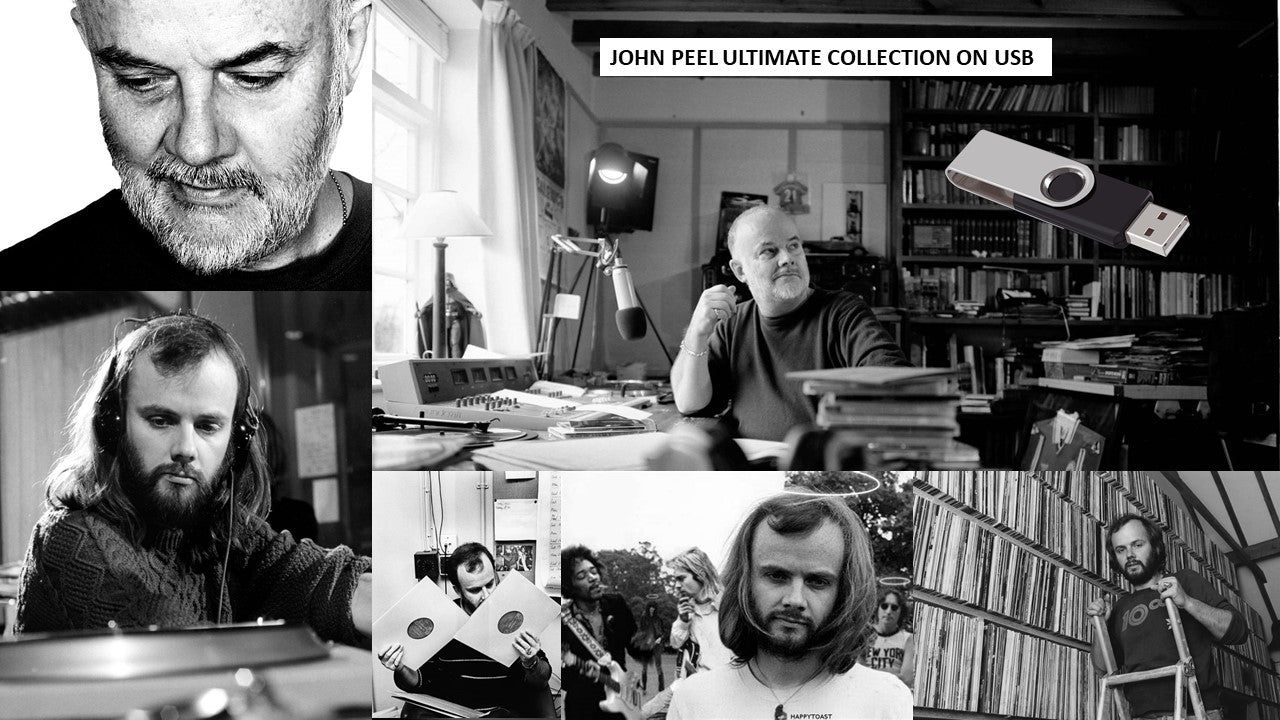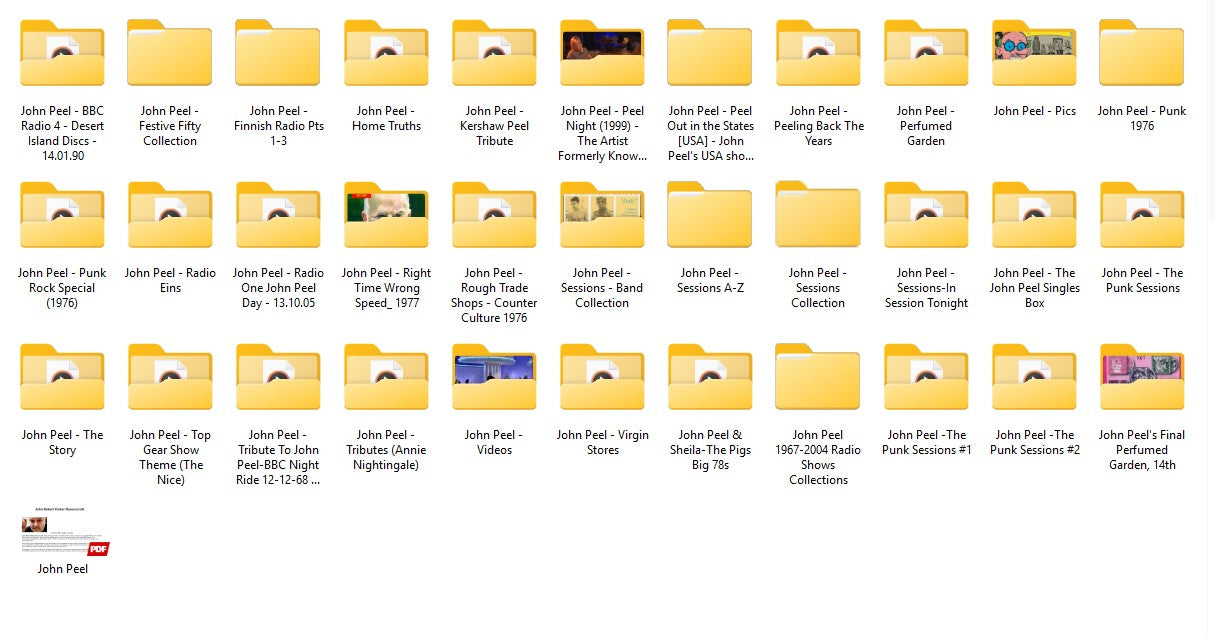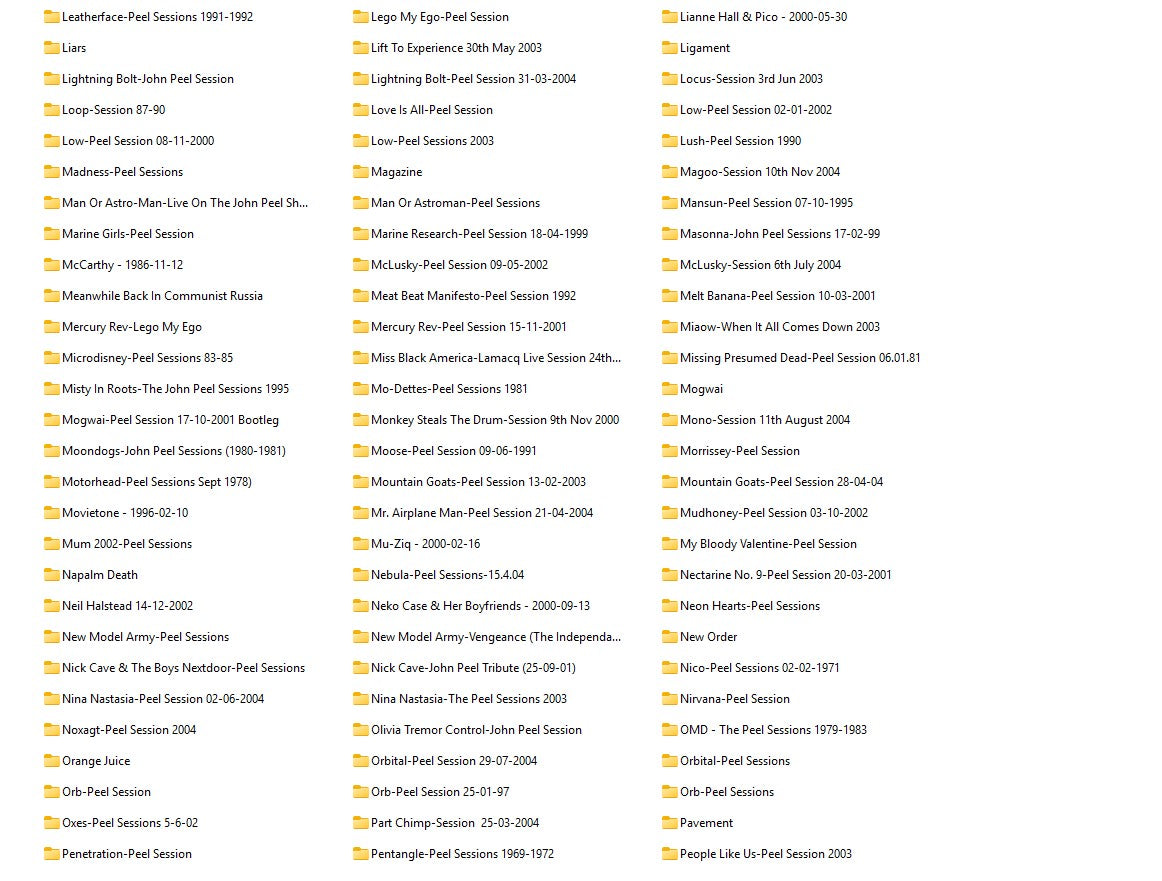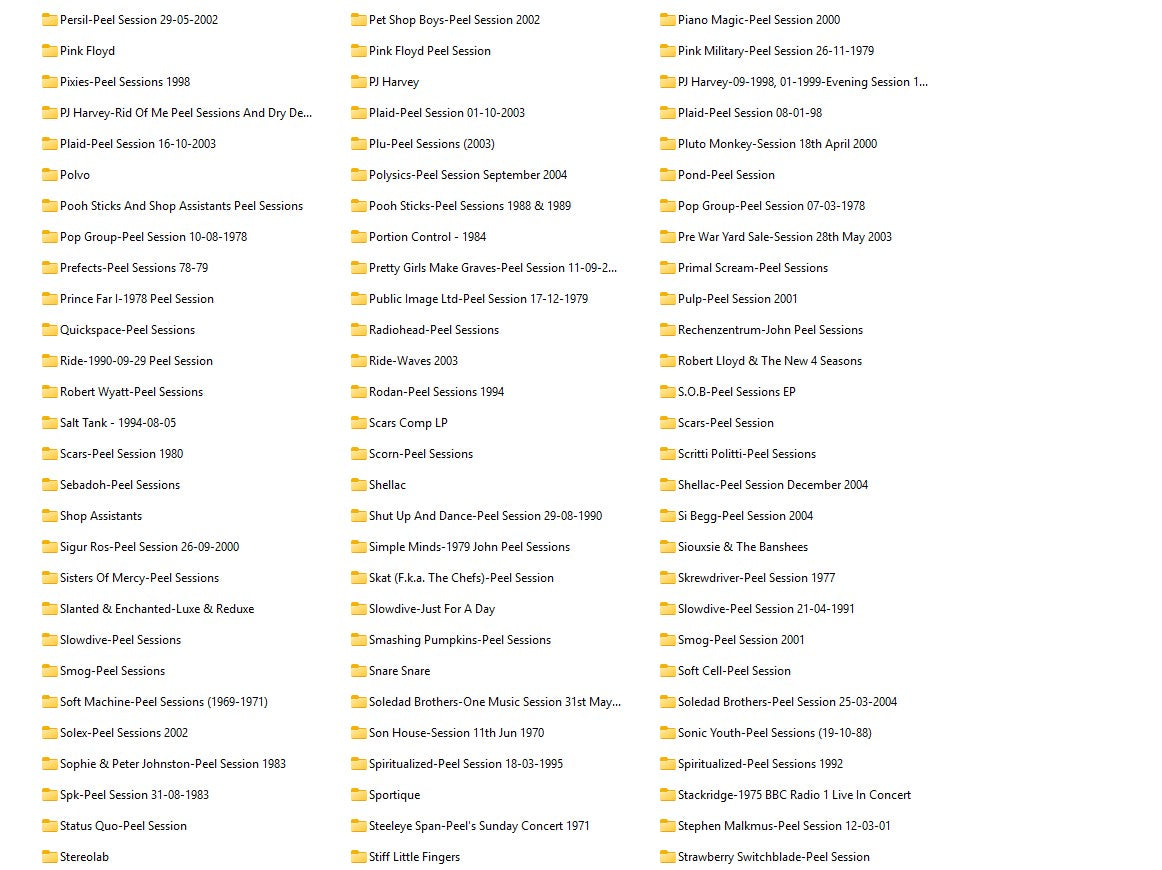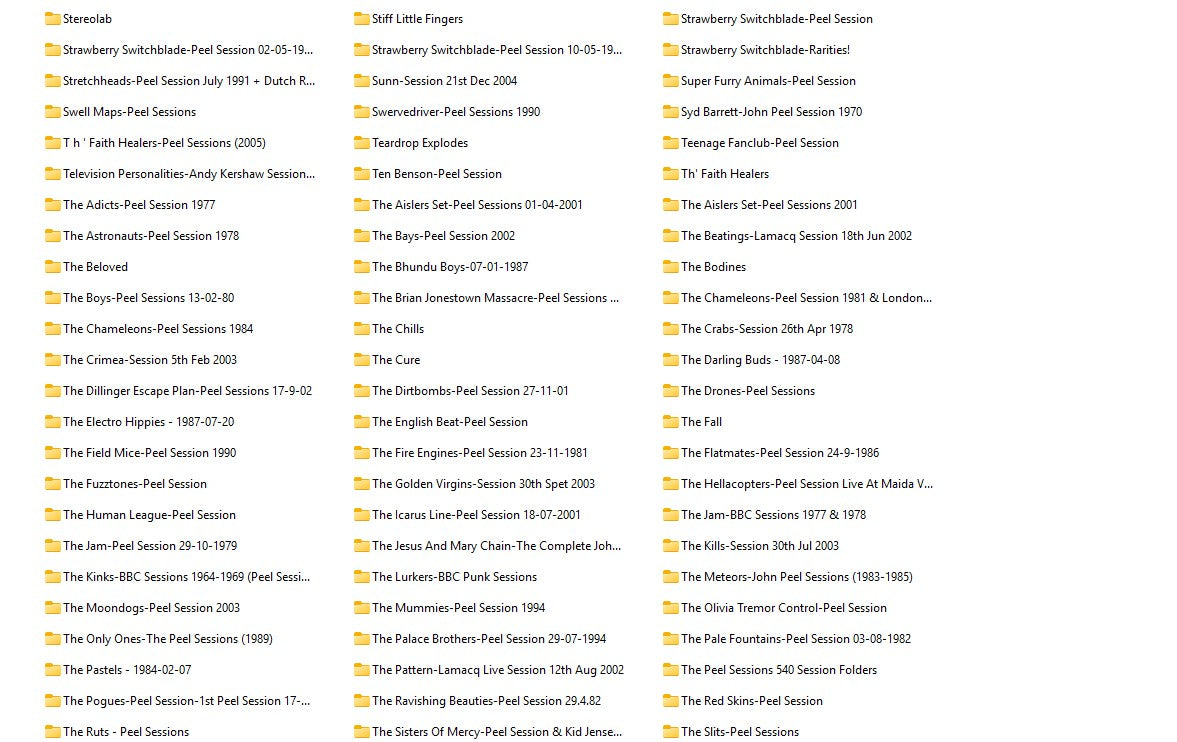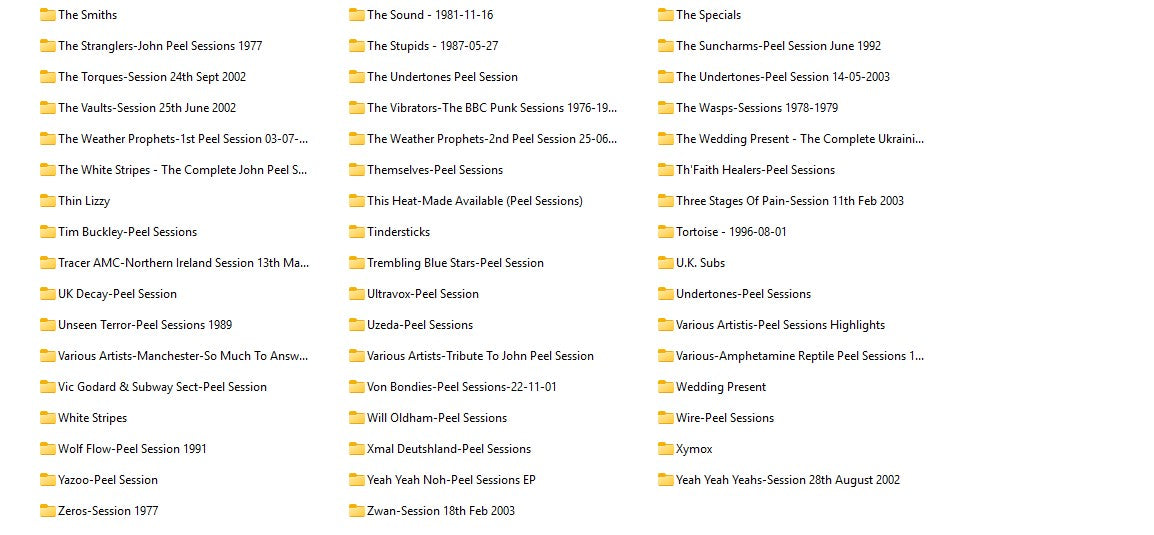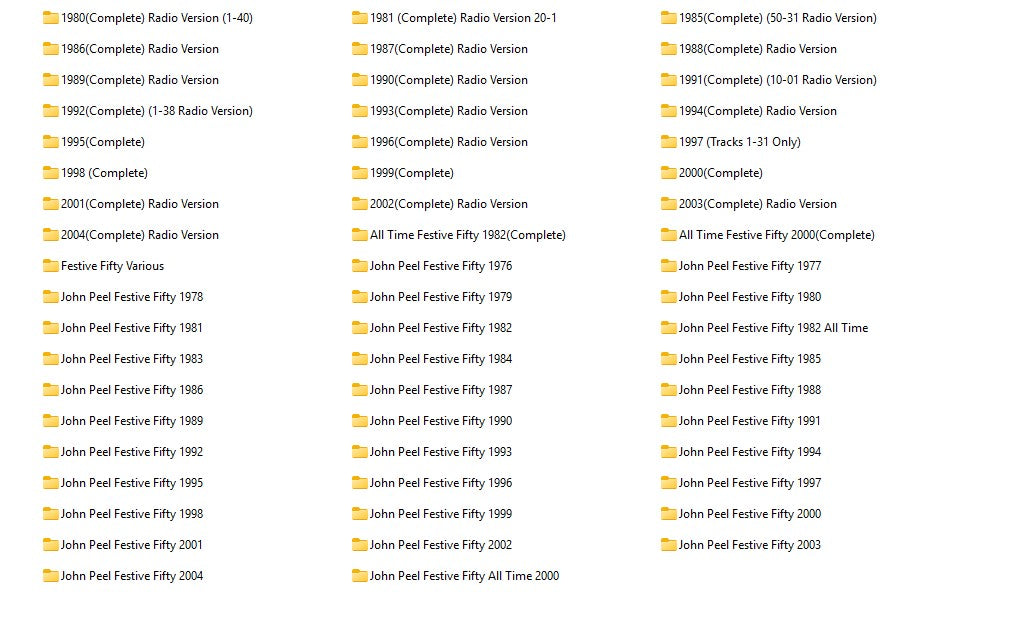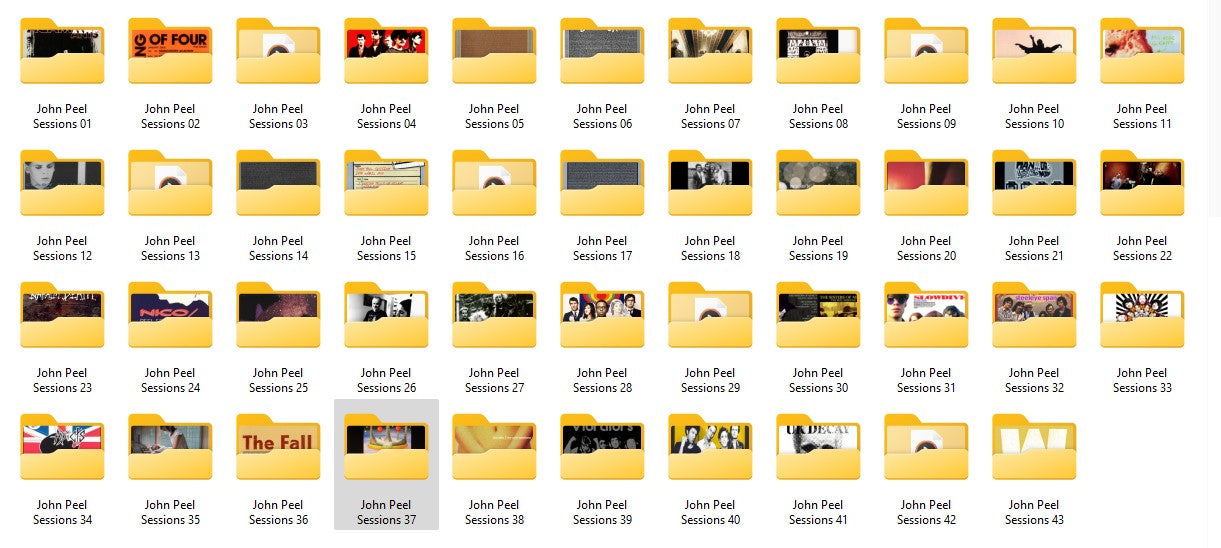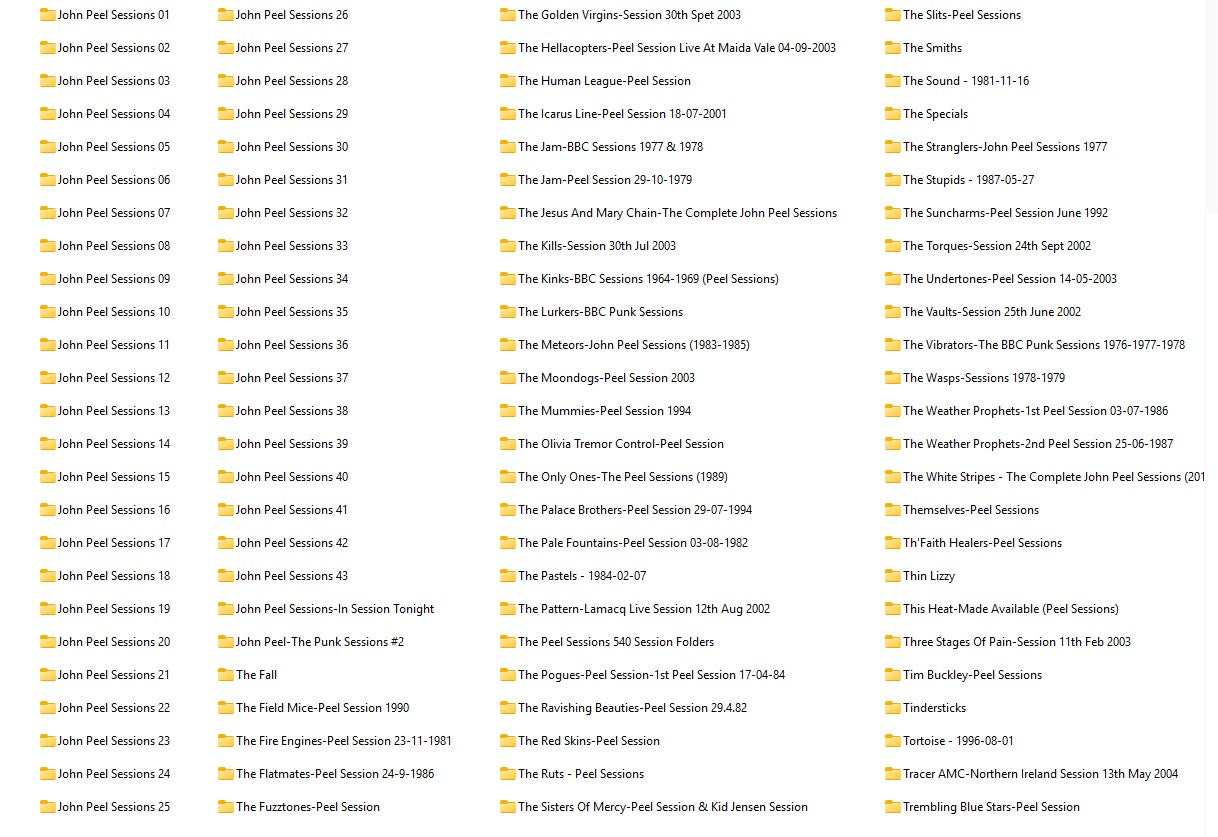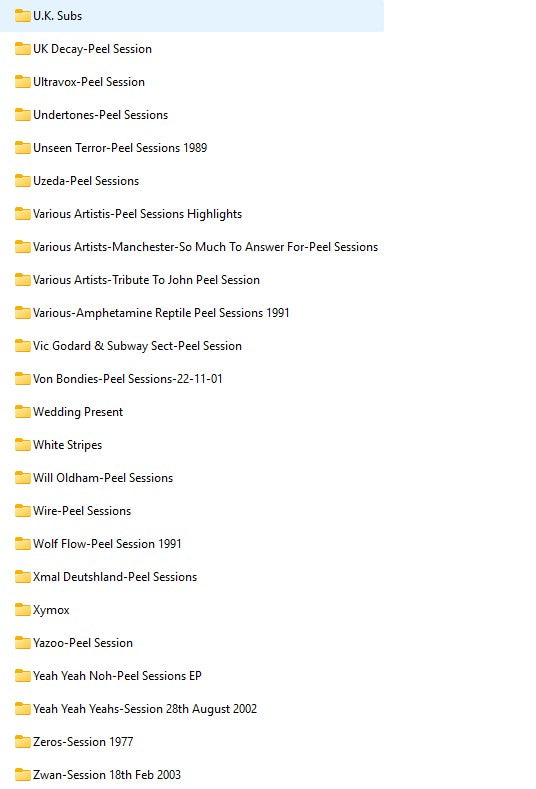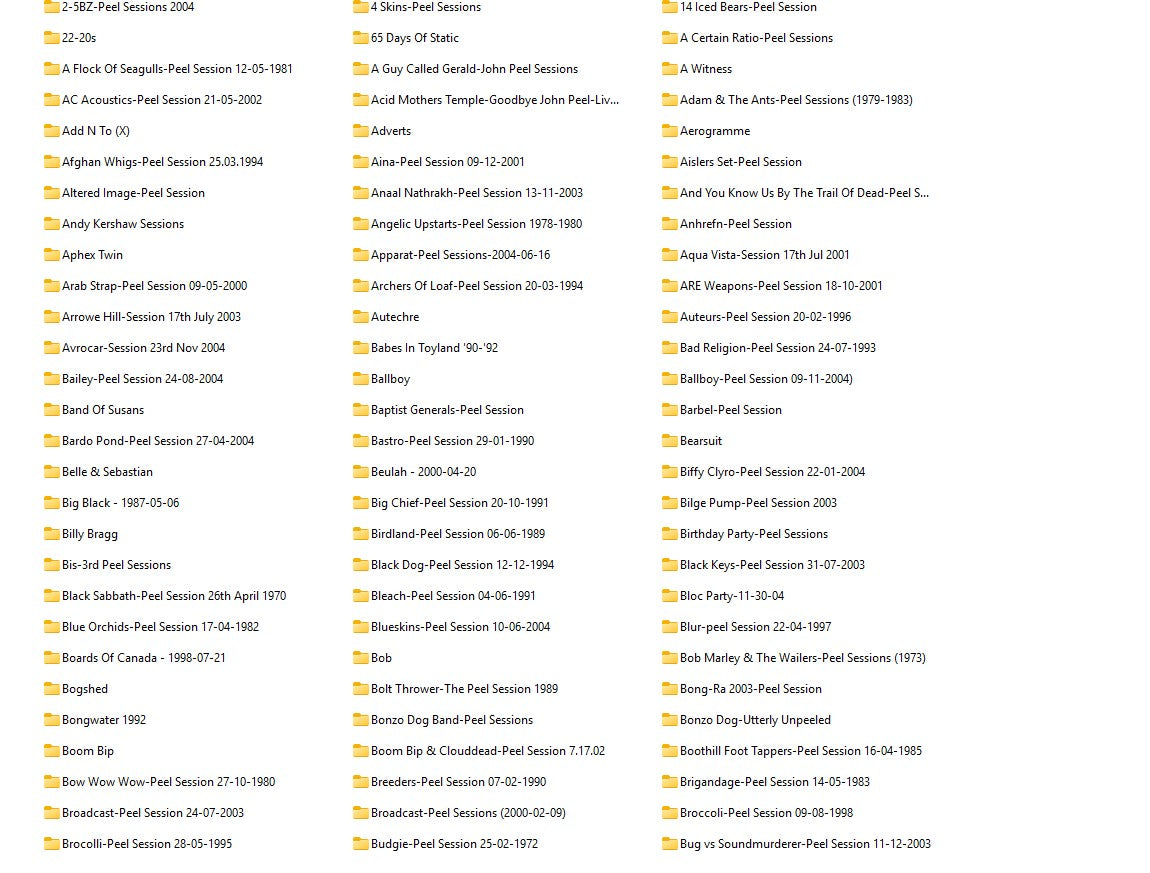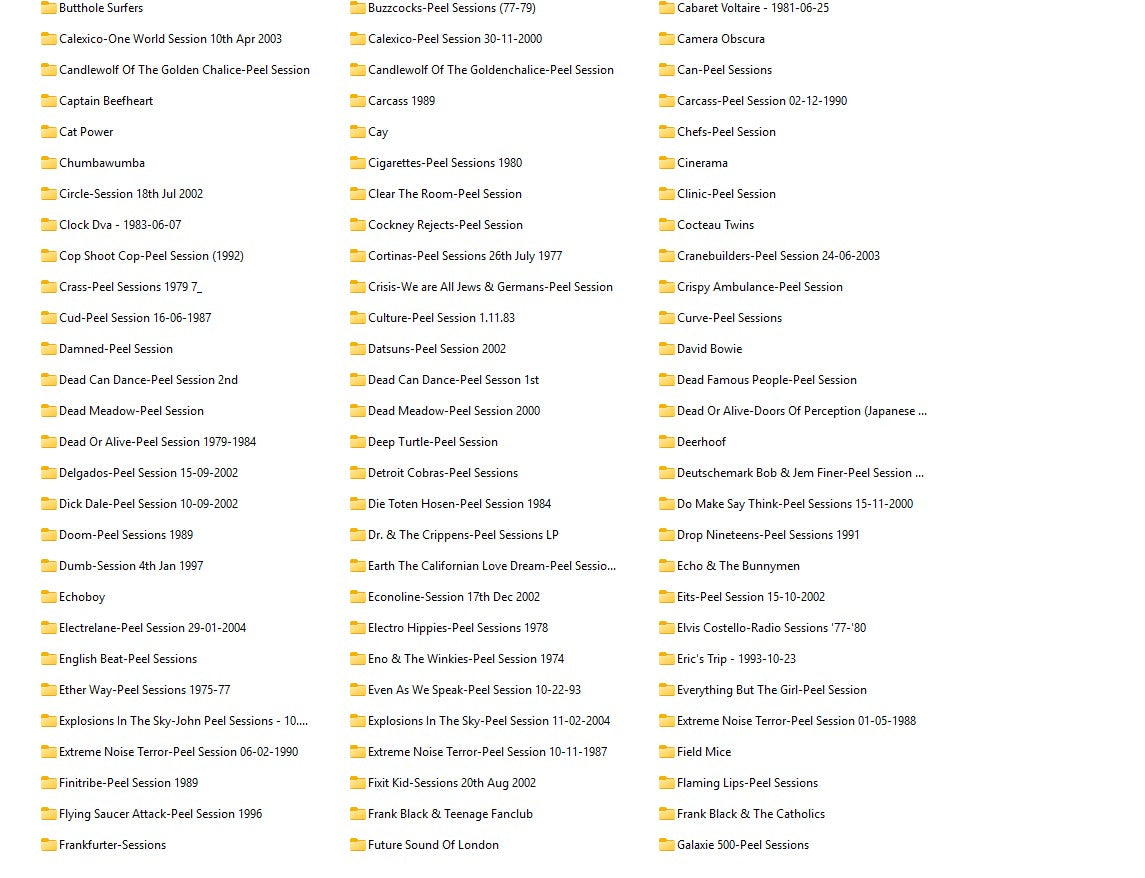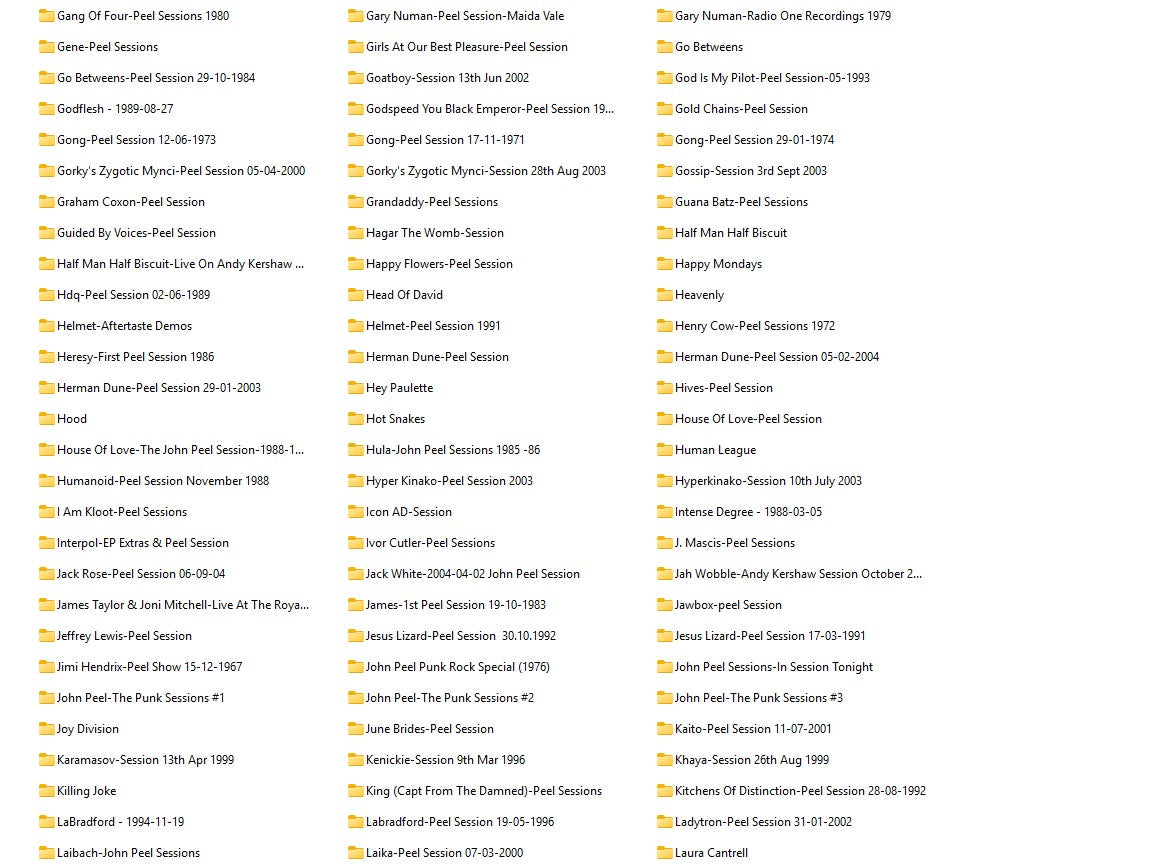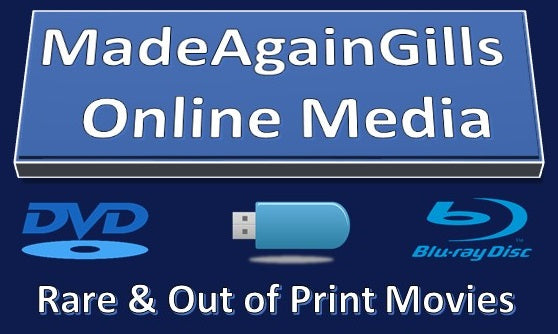MadeAgainGills Online Media
JOHN PEEL THE ULTIMATE RADIO COLLECTION ON USB 166GB
JOHN PEEL THE ULTIMATE RADIO COLLECTION ON USB 166GB
5.0 / 5.0
(1) 1 total reviews
Couldn't load pickup availability
JOHN PEEL THE ULTIMATE RADIO COLLECTION ON USB 166GB
WHAT A SUPERB COLLECTION OF JOHN PEEL ARTISTRY !
John Robert Parker Ravenscroft OBE (30 August 1939 – 25 October 2004), better known as John Peel, was an English radio presenter and journalist. He was the longest-serving of the original disc jockeys on BBC Radio 1, broadcasting regularly from 1967 until his death in 2004.
Peel was one of the first broadcasters to play psychedelic rock and progressive rock records on British radio. He is widely acknowledged for promoting artists of many genres, including pop, dub reggae, punk rock and post-punk, electronic music and dance music, indie rock, extreme metal and British hip hop. Fellow DJ Paul Gambaccini described Peel as "the most important single person in popular music from approximately 1967 through 1978. He broke more important artists than any individual.
Peel's Radio 1 shows were notable for the regular "Peel Sessions", which usually consisted of four songs recorded by an artist in the BBC's studios, often providing the first major national coverage to bands that later achieved fame. The annual Festive Fifty countdown of his listeners' favourite records of the year was a notable part of his promotion of new music.
Peel appeared on television occasionally as one of the presenters of Top of the Pops in the 1980s, and provided voice-over commentary for a number of BBC programmes. He became popular with the audience of BBC Radio 4 for his Home Truths programme, which ran from the 1990s, featuring unusual stories from listeners' domestic lives.
Early life
Peel was born John Robert Parker Ravenscroft at a nursing home in Heswall on 30 August 1939,the son of Joan Mary (née Swainson)and cotton merchant Robert Leslie Ravenscroft. He had two younger brothers and grew up in the nearby village of Burton. He was educated as a boarder at Shrewsbury School, where future Monty Python member Michael Palin was his contemporary. In his posthumously published autobiography, Peel said that he was raped by an older pupil while at the school.
Peel was an avid radio listener and record collector from an early age, firstly of music offered by the American Forces Network and Radio Luxembourg.He recalled an early desire to host a radio programme of his own "so that I could play music that I heard and wanted others to hear".His housemaster, R. H. J. Brooke, whom Peel described as "extraordinarily eccentric" and "amazingly perceptive", wrote on one of his school reports, "Perhaps it's possible that John can form some kind of nightmarish career out of his enthusiasm for unlistenable records and his delight in writing long and facetious essays.
Peel completed his national service in 1959 in the Royal Artillery as a B2 radar operator. Afterwards, he worked as a mill operative at Townhead Mill in Rochdale[12] and returned each weekend to Heswall on a scooter borrowed from his sister. While in Rochdale during the week, he stayed in a bed-and-breakfast in the area of Milkstone Road and Drake Street, and developed long-term associations with the town as the years progressed.[citation needed]
Career
United States
In 1960, aged 21, Peel went to the United States to work for a cotton producer who had business dealings with his father. He took a number of other jobs afterwards, including working as a travelling insurance salesman. While in Dallas, Texas, where the insurance company he worked for was based, he conversed with the presidential candidate John F. Kennedy, and his running mate Lyndon B. Johnson, who were touring the city during the 1960 election campaign, and took photographs of them.[citation needed] Following Kennedy's assassination in November 1963, Peel passed himself off as a reporter for the Liverpool Echo in order to attend the arraignment of Lee Harvey Oswald. He and a friend can be seen in the footage of the 22/23 November midnight press conference at the Dallas Police Department when Oswald was paraded before the media. He later phoned in the story to the Echo.
While working for the insurance company, Peel wrote programs for punched card entry for an IBM 1410 computer (which led to his entry in Who's Who noting him as a former computer programmer), and he got his first radio job working unpaid for WRR (AM) in Dallas. There, he presented the second hour of the Monday night programme Kat's Karavan, which was primarily hosted by the American singer and radio personality Jim Lowe. Following this, and as Beatlemania hit the United States, Peel was hired by the Dallas radio station KLIF as the official Beatles correspondent on the strength of his connection to Liverpool. He later worked for KOMA in Oklahoma City, Oklahoma, until 1965, when he moved to KMEN in San Bernardino, California, and used his birth name, John Ravenscroft, to present the breakfast show.
Return to England
Peel returned to England in early 1967 and found work with the offshore pirate radio station Radio London. He was offered the midnight-to-two shift, which gradually developed into a programme, The Perfumed Garden.
Peel's show was an outlet for the music of the UK underground scene. He played classic blues, folk music and psychedelic rock, with an emphasis on the new music emerging from Los Angeles and San Francisco. As important as the musical content of the programme was the personal – sometimes confessional – tone of Peel's presentation, and the listener participation it engendered. Underground events he had attended during his periods of shore leave, such as the UFO Club and the 14 Hour Technicolor Dream, together with causes célèbres like the drug busts of the Rolling Stones and John "Hoppy" Hopkins, were discussed between records. All this was far removed from Radio London's daytime format. Listeners sent Peel letters, poems and records from their own collections so that the programme became a vehicle for two-way communication; by the final week of Radio London he was receiving far more mail than any other DJ on the station.
After the closure of Radio London in 1967, Peel wrote a column, The Perfumed Garden, for the underground newspaper the International Times (from autumn 1967 to mid-1969).
BBC
When Radio London closed on 14 August 1967, Peel joined the BBC's new music station, BBC Radio 1, which was first broadcast on 30 September 1967. Unlike Big L, Radio 1 was not a full-time station but a broadcaster of a mixture of recorded music and live studio orchestras. Peel said he felt he was hired because the BBC "had no real idea what they were doing so they had to take people off the pirate ships because there wasn't anybody else". Peel presented a programme called Top Gear. At first he was obliged to share presentation duties with other DJs (Pete Drummond and Tommy Vance were among his co-hosts) but in February 1968 he was given sole charge of Top Gear. He presented the show until it ended in 1975.
In 1969, after hosting a trailer for a BBC programme on VD on his Night Ride programme, Peel received significant media attention because he divulged on air that he had suffered from a sexually transmitted disease earlier that year. This admission was later used in an attempt to discredit him when he appeared as a defence witness in the 1971 Oz obscenity trial.
The Night Ride programme, advertised by the BBC as an exploration of words and music, seemed to take up from where The Perfumed Garden had left off. It featured rock, folk, blues, classical and electronic music. A unique feature of the programme was the inclusion of tracks, mostly of exotic non-Western music, drawn from the BBC Sound Archive; the most popular of these were gathered on a BBC Records LP, John Peel's Archive Things (1970). Night Ride also featured poetry readings and numerous interviews with a wide range of guests, including his friends Marc Bolan, journalist and musician Mick Farren, poet Pete Roche, singer-songwriter Bridget St John and stars such as the Byrds, the Rolling Stones and John Lennon and Yoko Ono. The programme captured much of the creative activity of the underground scene. Its anti-establishment stance and unpredictability, however, did not find approval with the BBC hierarchy and it ended in September 1969 after 18 months.
In his sleeve notes to the Archive Things LP Peel calls the free-form nature of Night Ride his preferred radio format. His subsequent shows featured a mixture of records and live sessions, a format that would characterise his Radio 1 programmes for the rest of his career.
Punk era
Peel's enthusiasm for music outside the mainstream occasionally brought him into conflict with the Radio 1 hierarchy. On one occasion, the station controller Derek Chinnery contacted John Walters and asked him to confirm that the show was not playing any punk, which he (Chinnery) had read about in the press and of which he disapproved. Chinnery was evidently somewhat surprised by Walters' reply that in recent weeks they had been playing little else.
In a 1990 interview, Peel recalled his 1976 discovery of the first album by New York punk band the Ramones as a seminal event,
At that time almost all the new bands comprised of people who had previously been in successful bands who had broken up then reformed.... Well I played the first Ramones LP – it was identical to the first time I had heard Little Richard – the intensity was frightening! So I played five or six tracks on the next show and immediately I received mail from people demanding that I never play stuff like that again. Whenever that happens I always go in the opposite direction, so I played more and it was great! It was a classic case of changing courses in mid-stream and in a month the average age of the audience dropped by 10 years and the whole social class changed – which I was very pleased about.
In 1979, Peel stated: "They leave you to get on with it. I'm paid money by the BBC not to go off and work for a commercial radio station ... I wouldn't want to go to one anyway, because they wouldn't let me do what the BBC let me do."
Peel Acres in Great Finborough, Suffolk
Peel's reputation as an important DJ who broke unsigned acts into the mainstream was such that young hopefuls sent him an enormous number of records, CDs, and tapes. When he returned home from a three-week holiday at the end of 1986 there were 173 LPs, 91 12"s and 179 7"s waiting for him. In 1983 Alan Melina and Jeff Chegwin, the music publishers for unsigned artist Billy Bragg, drove to the Radio 1 studios with a mushroom biryani and a copy of his record after hearing Peel mention that he was hungry; the subsequent airplay launched Billy Bragg's career.
Studio at Peel Acres
In addition to his Radio 1 show, Peel broadcast as a disc jockey on the BBC World Service, on the British Forces Broadcasting Service (John Peel's Music on BFBS) for 30 years, VPRO Radio3 in the Netherlands, YLE Radio Mafia in Finland, Ö3 in Austria (Nachtexpress), and on Radio 4U, Radio Eins (Peel ...), Radio Bremen (Ritz) and some independent radio stations around FSK Hamburg in Germany. As a result of his BFBS programme he was voted, in Germany, "Top DJ in Europe".[citation needed]
Peel was an occasional presenter of Top of the Pops on BBC1 from the late 1960s until the mid-1990s, and in particular from 1982 to 1987 when he appeared regularly. In 1971 he appeared not as presenter but performer, alongside Rod Stewart and the Faces, pretending to play mandolin on "Maggie May". He often presented the BBC's television coverage of music events, notably the Glastonbury Festival.
From 26 September to 31 October 1987, Peel produced a six-part radio series on BBC Radio 1 called Peeling Back the Years. In it, he discussed his life and career at length with his long-time producer John Walters and also played some of his favorite records. The show's theme music was "Blue Tango" by Ray Martin which, Peel revealed, was the first record he ever bought.
Later years
Between 1995 and 1997, Peel presented Offspring, a show about children, on BBC Radio 4. In 1998, Offspring grew into the magazine-style documentary show Home Truths. When he took on the job presenting the programme, which was about everyday life in British families, Peel requested that it be free from celebrities, as he found real-life stories more entertaining. Home Truths was described by occasional stand-in presenter John Walters as being "about people who had fridges called Renfrewshire".[citation needed] Peel also made regular contributions to BBC Two's humorous look at the irritations of modern life Grumpy Old Men. His only appearances in an acting role in film or television were in Harry Enfield's Smashie and Nicey: The End of an Era as John Past Bedtime, and in 1999 as a "grumpy old man who catalogues records" in the film Five Seconds to Spare. However, he had provided narration for others.
He appeared as a celebrity guest on a number of TV shows, including This Is Your Life (1996, BBC), Travels With My Camera (1996, Channel 4 TV) and Going Home (2002, ITV TV), and presented the 1997 Channel 4 series Classic Trains. He was also in demand as a voice-over artist for television documentaries, such as BBC One's A Life of Grime.
In April 2003, the publishers Transworld successfully wooed Peel with a package worth £1.5 million for his autobiography, having placed an advert in a national newspaper aimed only at Peel. Unfinished at the time of his death, it was completed by Sheila and journalist Ryan Gilbey. It was published in October 2005 under the title Margrave of the Marshes. A collection of Peel's miscellaneous writings, The Olivetti Chronicles, was published in 2008.
Personal life & Marriages
At the age of 25, while residing in Dallas in 1965, Peel married 15-year-old American girl Shirley Anne Milburn.The marriage was never happy, with reports that she was often violent towards him. Although she accompanied Peel back to England in 1967, they were soon separated and the divorce became final in 1973. In 1987, Milburn took her own life.
Peel married Sheila Gilhooly on 31 August 1974. The reception was held at Regent's Park, with Rod Stewart as best man. In the 1970s, Peel and Gilhooly moved to "Peel Acres", a thatched cottage in Great Finborough. In later years, Peel broadcast many of his shows from a studio in the house, with Gilhooly and their children often being involved or at least mentioned. Peel's passion for Liverpool FC was reflected in his children's names: William Robert Anfield Ravenscroft, Alexandra Mary Anfield Ravenscroft, Thomas James Dalglish Ravenscroft, and Florence Victoria Shankly Ravenscroft. Thomas, now better known as Tom Ravenscroft, also became a radio DJ.
Share
